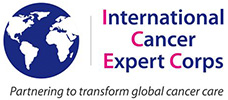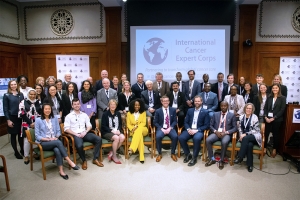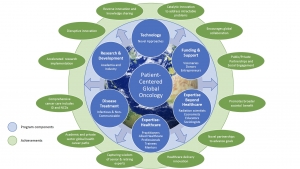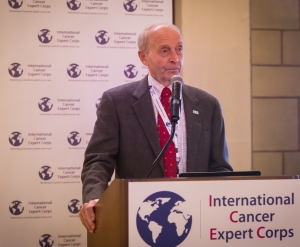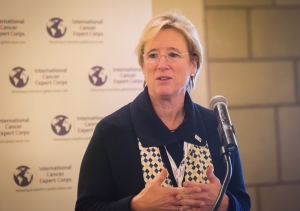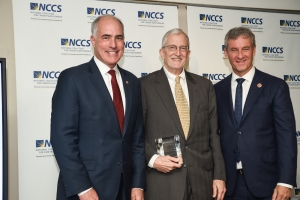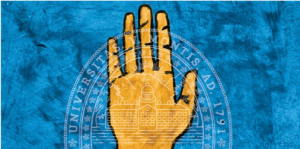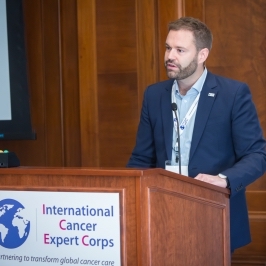The ICEC Essential News Letter
Volume 5| Number 1| Winter 2019
GENERAL
ICEC continues to broaden its outreach to developing cancer care programs and to those interested in careers in global health through the establishment of Twinning Programs, individual mentoring partnerships, our membership in global cancer programs and participation in international meetings.
PROGRAM DEVELOPMENT
Young Investigators’ Conference: Pioneering Action for Global Cancer Care
The inaugural ICEC Young Investigators’ Conference, held February 14-15, 2019 at the National Academy of Sciences and Medicine, brought together young cancer care professionals and global oncology leaders from diverse regions to discuss the unique opportunities and challenges that they encounter at their home institutions and practices as well as their efforts abroad. The conference highlighted efforts related to mentorship, education, training, and global oncology career building while guiding systematic, incremental improvements in cancer care delivery programs in low- and middle-income countries (LMICs). The conference sessions and presentations are available on the ICEC website including an inspiring keynote address, “Confronting the Global Health Disparity of Cervical Cancer” delivered by Dr. Douglas R. Lowy, Deputy Director of the National Cancer Institute.
The sessions covered a range of topics, including, Why global oncology matters?; Why is Global Oncology Important?; Local-Global Oncology – Addressing the needs of the underserved locally; Global Oncology Policy Perspectives; Building Ethical, Mutually Beneficial Global Oncology Partnerships: Models of academic global oncology career paths; General Aspects of Relationships/Partnerships: The importance of building ethical partnerships including Basic Science, Clinical Research, and Capacity Building and Educational Partnerships. The first day concluded with Selected Poster Presentations highlighting the efforts of researchers, early practitioners and medical trainees, and medical students. Day two focused on Career Development in Global Oncology: Expectations, opportunities and solutions providing the perspectives of both Young Investigators as well as the perspective of Senior Mentors and Chairs/Directors. Interactive breakout sessions served as a catalyst for important discussions regarding Choosing the Right Mentor and Being a Mentor, Work-Life Balance, Global Oncology and Academic Promotion, and Being an Effective Global Oncology Partner.
A Broad Impact for Global Oncology. Coleman CN, Wendling EN, Pistenmaa DA. JAMA Oncol. 2019 Aug 8
Building from the conference’s opening presentation, “Why Global Oncology Matters,” the graphic from the JAMA Oncology commentary describes six major components (blue circles) of patient-centered global oncology. What can be accomplished is included in the 12 green ovals. Noteworthy is their very broad impact and benefits beyond, the benefits healthcare including novel medical and healthcare practices, disruptive technology, unique career opportunities in human service, research to better understand cancer etiology and its relationship to other non-communicable diseases, and societal benefit of cooperative ventures for the common good. When often asked “why do this” or “what’s in it for me,” this commentary and figure illustrate the enormous impact.
UPCOMING MEETINGS
ICEC, in conjunction with the Princess Margaret Cancer Center, will host the conference entitled “Cancer AI & Big Data: Success through Global Collaboration”. The conference will envision clinical practice in the era of AI & Big Data to better understand AI’s role in global health, explore the translation of AI & Big Data into clinical practice, and examine the role of AI & Big Data in shaping healthcare teams of the future. To learn more about the conference agenda and speakers, and to register, click here.
CAREER PATH
Bona fide career path for global oncology –
The ICEC’s Young Investigators’ Conference, “Pioneering Action for Global Cancer Care,” touched upon the issue: What is now needed is a bona fide career path for global oncology.
Perhaps the significant gap to fill for progress in global health is what ICEC denotes as “owning someone’s time” so that there can be a sustainable career path. As with all aspects of professional effort, finding time requires planning, assessment and adaptation. Many aspects of professional medical careers are the expected and accepted routines of patient care, teaching, administration, participation in research, community service and professional development, among others. These are generally supported by practice revenue. Up to now, time spent on global health has largely been considered extraneous and even detrimental to a career and, thus, is often accomplished on vacation and weekends. Therefore, participation in global health is mostly unpredictable and seemingly haphazard. Academic departments expect work in global health to be supported by outside funding such as grants which are challenging to obtain. This is true even more nowadays because of fierce competition for research dollars often pitting global health against basic science and innovative (and expensive) new imaging and treatment technology. Outside funding is certainly desirable, but for programs to depend largely or entirely on such financing predictably leads to discontinuity of programs which is not acceptable when patient care is involved. We hear many stories from our Young Leaders alleging that their department chairs declare that this work is not affordable and cannot be done as part of their jobs. This is often experienced even in large-sized departments where asking for 20% or so of time from 1-2 faculty members should be manageable. That the lack of ability to spend time with patients and increasing physician burnout is widely recognized is nicely summarized in the New England Journal of Medicine (J. Noseworthy. The future of care- preserving the patient-physician relationship, 381:2265, 2019).
This attitude may now be changing due, in part, to positive pressure from emerging young leaders who have an interest expanding the scope of practice in radiation oncology. Below are three examples of papers in well-read journals for which prominent authors are ICEC Early Career leaders.
- “Enhancing Career Paths for Tomorrow’s Radiation Oncologists”. Vapiwala N, Thomas CR Jr, Grover S, Yap ML, Mitin T, Shulman LN, Gospodarowicz MK, Longo J, Petereit DG, Ennis RD, Hayman JA, Rodin D, Buchsbaum JC, Vikram B, Abdel-Wahab M, Epstein AH, Okunieff P, Goldwein J, Kupelian P, Weidhaas JB, Tucker MA, Boice JD Jr, Fuller CD, Thompson RF, Trister AD, Formenti SC, Barcellos-Hoff MH, Jones J, Dharmarajan KV, Zietman AL, Coleman CN. Int J Radiat Oncol Biol Phys. 2019 Sep 1;105(1):52-63.
-This paper identifies ten areas into which radiation oncology practice can be expanded including global health, government service, outcomes & policy, epidemiology, palliative care and frontier medicine. These areas are directly related to addressing disparities in access to healthcare globally as well as in geographically isolated regions in the US and other resource-rich countries, particularly for indigenous populations.
2. “Shaping the Path for a Global Oncology Academic Career”. Balogun OD, Choi AMK, Formenti SC. JAMA Oncol. 2019 Jul 1;5(7):931-932.
-This paper shows that it is a challenge to assess progress and recognize accomplishments in global health because, in part, the usual measures of success in academia are currently difficult to achieve, including publication in what are called “high impact” journals and attaining sustainable grant support, particularly from prestigious funding sources such as the National Institutes of Health. Given the highly competitive nature and low success rate (~10%) for grant funding, it is a challenge to obtain and sustain a funding stream. Of necessity, most scientists spend a significant amount of their time in the funding process.
3. “Global Health in Radiation Oncology: The Emergence of a New Career Pathway”, Semin Radiat Oncol. 2017 Apr;27(2):118. Co-authors are Danielle Rodin, Mei Ling Yap, Surbhi Grover, John M. Longo, Onyinye Balogun, Sandra Turner, Jesper G. Eriksen, C. Norman Coleman and Meredith Giuliani.
-The paper explores how defining specific competencies in this area can help trainees and practitioners integrate their activities in global health within their existing roles as clinicians, educators, or scientists. Defining these would also help create a new global health track for academic advancement, which could focus on such domains as implementation science, health service, and advocacy. It discusses how effective mentorship models, international partnerships, and institutional twinning arrangements support this work and explores how new resources and funding models might be used to further develop and expand radiation oncology services globally.
Of note is that the Presidential Symposium and overall meeting theme at the American Society of Radiation Oncology 2020 Annual Meeting in Miami will be Global Health under the leadership of President-elect Thomas Eichler. Norm Coleman, Surbhi Grover, and others from ICEC are helping develop the program.
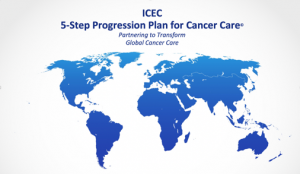 Metrics for planning, implementation, assessment and ongoing improvement: Responding to a Critical Need: The ICEC 5-Step Progression Plan for Cancer Care©
Metrics for planning, implementation, assessment and ongoing improvement: Responding to a Critical Need: The ICEC 5-Step Progression Plan for Cancer Care©
Currently, ICEC is working with nearly 30 affiliated ICEC Twinning Programs and mentoring partnerships in LMICs and in underserved regions in upper-income countries to improve the quality of guideline- and protocol-based cancer care according to specific metrics reflected in ICEC’s 5-Step Progression Plan for Cancer Care through education, training, and mentoring. The aim of the 5-Step Plan is for the healthcare facility to develop its cancer workforce capabilities while simultaneously growing its workplace capacity sufficiently to pass an international accreditation evaluation in order to be able to participate in international clinical trials. The ICEC 5-Step Progression Plan for Cancer Care received official copyright registration from the United States Copyright Office, and copies of the plan can be ordered from ICEC. Send requests to info@iceccancer.org.
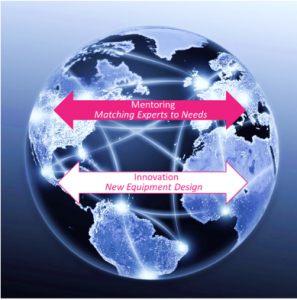 INNOVATION IN TECHNOLOGY – UPDATE ON THE ICEC/CERN/STFC NOVEL LINAC PROJECT
INNOVATION IN TECHNOLOGY – UPDATE ON THE ICEC/CERN/STFC NOVEL LINAC PROJECT
ICEC: Two related pathways: mentoring and innovation in the application of technology.
The need for robust, first-rate radiation treatment systems capable of functioning in the challenging environments encountered in many developing countries is well-recognized. For the last four years, ICEC has been working to identify solutions that address this complex issue through hosting workshops and meetings in the US, Europe and Africa.
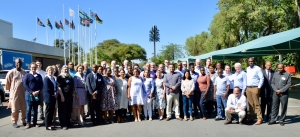 “Accelerating the Future: Designing a Robust and Affordable Radiation Therapy Treatment System for Challenging Environments”
“Accelerating the Future: Designing a Robust and Affordable Radiation Therapy Treatment System for Challenging Environments”
The most recent workshop, with that title was held in Gaborone, Botswana on March 20-22, 2019. It was sponsored by STFC with funding from the UK Global Challenges Research Fund (GCRF) and was supported by CERN and ICEC. The purpose of the conference was to coordinate efforts to design and develop an affordable and robust yet technically sophisticated linear accelerator-based radiation therapy treatment (RTT) system. Convening this conference in Gaborone enabled a significant number (over one-half of the attendees) of physicians, physicists and staff from Sub-Sahara Africa and other LMICs to interact directly with the scientists developing the novel linac thereby generating a sense of a global community working toward a common goal. Read more about what we accomplished and our goals going forward on our website.
ICEC CENTERS AND ASSOCIATES/HUBS AND EXPERTS
As the roster of ICEC’s twinning partnerships continues to grow, ICEC is assessing the progression of the partnerships according to the ICEC 5-Step Progression Plan for Cancer Care© in their ability to deliver high-quality care as well as to meet the appropriate education, training and mentorship metrics with the long-term goal of each program’s becoming a recognized regional cancer center. To learn more, or if you are interested in joining ICEC as an ICEC Expert or Associate, please visit our Twinning Programs webpage.
In conjunction with the implementation of the 5-Step Plan, ICEC continues to encourage the use of the National Comprehensive Cancer Network (NCCN)’s Framework for Resource Stratification of NCCN Guidelines (NCCN Framework™) and the NCCN Harmonized Guidelines™ for Sub-Saharan Africa. These guidelines represent both the optimal care that these countries aspire to provide and the pragmatic approaches that provide effective treatment options for resource-constrained settings.
All of these resources are particularly valuable tools to be used in LMICs and other challenging environments. ICEC appreciates the unique opportunity to work toward formal guideline and protocol development with the NCCN expert group that is which is closely connected with the major academic cancer centers.
OUTREACH AND DEVELOPMENT
ICEC Awards and Funds
ICEC continues to garner support for three funds exclusive to ICEC including the Ellen Lewis Stovall Early Career Leaders Fund, the Rodney R. Million, MD Fund for Innovation in Clinical Care and the Henry S. and Leah Kaplan Human Rights and Service to Humanity Fund. The Stovall and Million funds, awarded through competitive peer-reviewed grant applications, provide ICEC with the resources to directly support practitioners in their efforts to improve global cancer care in challenging environments. These funds are designed to provide financial support to early career healthcare practitioners focused on global cancer care, a group that often faces funding challenges while pursuing academic medical careers. Currently Early Career Leaders are actively running twinning programs or fostering mentoring relationships in countries including Armenia, Tanzania, Nigeria, Cambodia, Kenya, Gabon, India, Botswana, Ghana and Uganda.
ICEC has established two tracks to acknowledge individuals who exemplify the spirit of Henry and Leah Kaplan in their work. The Henry S. and Leah Kaplan Human Rights and Service to Humanity Fund provides peer-reviewed support for mentorship and leadership activities for the ICEC. This includes individual peer-reviewed grants to partially support mentorship and group peer-reviewed grants for specific ICEC-affiliated projects that emphasize the human rights aspect of global health.
An occasional separate and distinct award, the Henry S. and Leah Kaplan Human Rights and Service to Humanity Award, serves as an instrument of good to highlight the efforts of select extraordinary individuals whose work has had a truly significant impact on global health. This year, Dr. David A. Pistenmaa and Eugenia (Nina) Wendling, were designated recipients of the Henry S. and Leah Kaplan Human Rights and Service to Humanity Award for their ongoing dedication to the organization and for furthering efforts to improve the delivery of global cancer care.
To make a donation to support any of these grants or to make a contribution for general support of ICEC, please visit the ICEC website’s donation page.
RECOGNITION/IN THE NEWS
Dr. Harmar D. Brereton, an ICEC Board member, received The Ellen L. Stovall Award for Innovation in Patient-Centered Cancer Care, awarded by the National Coalition for Cancer Survivorship, in honor of Ellen Stovall, a founding board member of ICEC and a longtime CEO of NCCS who passed away in 2016. The Stovall Award is awarded annually to individuals, organizations, or other entities who demonstrate innovation in improving cancer care for patients in America. Dr. Brereton’s efforts and innovative approaches to improve cancer care for individuals in the US and worldwide are detailed in this Tribute video produced by NCCS.
From l-r: The Hon. Matt Cartwright (PA),
Dr. Harmar D. Brereton, The Hon. Bob Casey (PA).
(Photo: Leslie E. Kossoff/LK Photos, courtesy of NCCS)
Vermont Quarterly Magazine
ICEC’s Senior Scientific Advisor, Dr. C. Norm Coleman and ICEC’s President and Board Chair, Lawrence Roth, are highlighted in the University of Vermont’s (UVM) Vermont Quarterly Magazine for their efforts regarding the founding of and advancing the work of the International Cancer Expert Corps. Read the article here
Early Career Leaders
Jean-Marc Bourque, MD
ICEC welcomes Dr. Jean-Marc Bourque as an ICEC Ellen Lewis Stovall Early Career Leader, Dr. Bourque is a Radiation Oncologist and Assistant Professor of Radiation Oncology at the University of Ottawa. He also serves as an Adjunct Professor of Medicine at the McGill University and is a PhD Candidate, London School of Hygiene and Tropical Medicine. He is a Research Affiliate with the Institute of Cancer Policy, King’s College London.
Dr. Bourque will soon transition to the lead ICEC Expert working with medical practitioners at the National Center of Oncology in Yerevan, Armenia. Dr. Onyinye Balogun, a radiation oncologist at Weill Cornell and ICEC Early Career Leader, will transition the lead of the Armenia twinning program to Dr. Bourque as she establishes another twinning program in Nigeria. Learn more about Dr. Bourque and be sure to follow his efforts on our website in the upcoming months.
Presentations and attendance related to ICEC at various meetings:
- NCI 7th Annual Symposium on Global Cancer Research, March 8-10, 2019 Dr. Norm Coleman, (CUGH 9th Annual Meeting) Translation & Implementation for Impact in Global Cancer Research
- North American Particle Accelerator Conference, September 2019. David Pistenmaa, “Novel Medical Linacs for Challenging Environments”, Lansing, MI
- IAEA Forum, “A Decade of Action on Cancer Control and the Way Forward”, September 2019: Vienna, Austria, Nina Wendling and Miles Pomper
- 10th International Particle Accelerator Conference, May 2019, Peter McIntosh, “Collaborative Strategies for Meeting the Global Need for Cancer Radiation Therapy Treatment Systems”, Melbourne, Australia
Organization and Operations
The ICEC Central Operations Working Group (COWG) convenes weekly. Notably, members of our “volunteer” staff are providing extensive expertise: Costing out the hours of volunteerism, ICEC had nearly 4500 donated hours for 2018. Using the NIH FTE rate (not the actual salaries which would be greater), this amounts to more than $799,000. In addition, ICEC hires interns to assist with COWG communications, outreach and our technology innovation research efforts. Thanks to a dedicated group of individuals who support ICEC, the organization anticipates exceeding this number in 2019.
ICEC is a member of the Union for International Cancer Control (UICC (Geneva) as well as a participating member of the Global Health Council, the Global Health Security Roundtable and the NCD Alliance and NCD Roundtable. Staff and Board members routinely attend and participate in conferences, meetings and other opportunities to engage with the global community in efforts reducing disparities in the delivery of cancer care.
Board of Directors and Advisory Board
New Advisory Board members
Ceferino Obcemea, PhD, joined ICEC’s Advisory Board helping the organization to improve access to affordable radiation therapy in LMICs and other challenging environments. Dr. Ceferino’s experience as a medical physicist provides great insight to ICEC’s core initiatives and twinning programs.
Lee. M. Chin, D.Sc., joined ICEC’s Advisory Board in 2019. With a keen interest in clinical mentoring, Dr. Chin provides critical advice and guidance in ICEC’s innovative technology program.
Development
ICEC continues its efforts to raise funds to support its many activities and encourages all types of contributions to facilitate support of our mission including individual donations, corporate and foundation support and planned-giving opportunities. ICEC’s support of its Early Career Leaders has garnered the interest of foundations and corporate support.
To make a donation to support the Kaplan, Stovall, and Million Funds, or to make a contribution for general support of ICEC, please visit the ICEC website’s donation page.
AmazonSmile
ICEC participates with the Amazon Smile program. Designate ICEC as your charitable organization to support when shopping on AmazonSmile? On your first visit to AmazonSmile smile.amazon.com, you need to select a charitable organization to receive donations from eligible purchases before you begin shopping. Amazon will remember your selection, and then every eligible purchase you make at smile.amazon.com will result in a donation to the International Cancer Expert Corps.
Publications of interest: (since the last Essential News Letter related to ICEC and/or from ICEC members relevant to global health; readers, please provide additional citations)
Enhancing Career Paths for Tomorrow’s Radiation Oncologists. Vapiwala N, Thomas CR Jr, Grover S, Yap ML, Mitin T, Shulman LN, Gospodarowicz MK, Longo J, Petereit DG, Ennis RD, Hayman JA, Rodin D, Buchsbaum JC, Vikram B, Abdel-Wahab M, Epstein AH, Okunieff P, Goldwein J, Kupelian P, Weidhaas JB, Tucker MA, Boice JD Jr, Fuller CD, Thompson RF, Trister AD, Formenti SC, Barcellos-Hoff MH, Jones J, Dharmarajan KV, Zietman AL, Coleman CN. Int J Radiat Oncol Biol Phys. 2019 Sep 1;105(1):52-63.
Accelerating the Future: Designing a Robust and Affordable Radiation Therapy TREATMENT SYSTEM for Challenging Environments. Dosanjh M, Georgieva P. Enlight Highlights, 2019 July;12-19.
Shaping the Path for a Global Oncology Academic Career. Balogun OD, Choi AMK, Formenti SC. JAMA Oncol. 2019 Jul 1;5(7):931-932.
Comparative analysis of radiotherapy LINAC downtime and failure modes in the UK, Nigeria and Botswana.
Wroe LM, Ige TA, Asogwa OC, Aruah SC, Grover S, Makufa R, Fitz-Gibbon M, Sheehy SL. Clinical Oncology, 2019, ISSN 0936-6555, https://doi.org/10.1016/j.clon.2019.10.010.
Global palliative radiotherapy: a framework to improve access in resource-constrained settings. Elmore SNC, Grover S, Bourque JM, Chopra S, Nyakabau AM, Ntizimira C, Krakauer EL, Balboni TA, Gospodarowicz MK, Rodin D. Ann Palliat Med. 2019 Jul;8(3):274-284.
Developing Innovative, Robust and Affordable Medical Linear Accelerators for Challenging Environments. Dosanjh M, Aggarwal A, Pistenmaa D, Amankwaa-Frempong E, Angal-Kalinin D, Boogert S, Brown D, Carlone M, Collier P, Court L, Di Meglio A, Van Dyk J, Grover S, Jaffray DA, Jamieson C, Khader J, Konoplev I, Makwani H, McIntosh P, Militsyn B, Palta J, Sheehy S, Aruah SC, Syratchev I, Zubizarreta E, Coleman CN. Clin Oncol (R Coll Radiol). 2019 Jun;31(6):352-355.
A Broad Impact for Global Oncology. Coleman CN, Wendling E, Pistenmaa DA. JAMA Oncol. 2019;5(10):1397–1398.
Global health and cancer. Roth L, Wendling EC, Coleman CN, Pistenmaa DA, O’Brien DM.
Lancet. 2019 Mar 9;393(10175):983-984.
Other Articles of Interest by ICEC partners
Worldwide Access to Stereotactic Radiosurgery. Pannullo SC, Julie DAR, Chidambaram S, Balogun OD, Formenti SC, Apuzzo MLJ, Knisely JPS. World Neurosurg. 2019 Oct;130:608-614.
Pediatric Cancer in Northern Tanzania: Evaluation of Diagnosis, Treatment, and Outcomes. Schroeder K, Saxton A, McDade J, Chao C, Masalu N, Chao C, Wechsler DS, Likonda B, Chao N. J Glob Oncol. 2018 Sep;4:1-10.
Impact of Essential Medicine Stock Outs on Cancer Therapy Delivery in a Resource-Limited Setting. Martei YM, Grover S, Bilker WB, Monare B, Setlhako DI, Ralefala TB, Manshimba P, Gross R, Shulman LN, DeMichele A. J Glob Oncol. 2019 Apr;5:1-11.
Scale-up of radiotherapy for cervical cancer in the era of human papillomavirus vaccination in low-income and middle-income countries: a model-based analysis of need and economic impact. Rodin D, Burger EA, Atun R, Barton M, Gospodarowicz M, Grover S, Hanna TP, Jaffray DA, Knaul FM, Lievens Y, Zubizarreta E, Milosevic M. Lancet Oncol. 2019 Jul;20(7):915-923.

